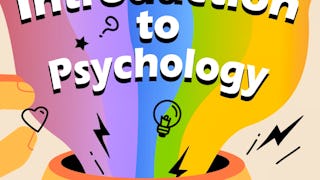This course is an introduction to human cognition and how it is explored. You will explore how Psychology was born as a separate discipline and how we began to study the nervous system in terms of functions, abilities and traits linking brain, mind, behavior and relationship with the environment.



Introduction to Cognitive Psychology and Neuropsychology
Ce cours fait partie de Spécialisation The science of mind and decision making
Inclus avec 
Compétences que vous acquerrez
- Catégorie : Psychology
- Catégorie : Human Learning
- Catégorie : Neurology
- Catégorie : Learning Theory
- Catégorie : Research Methodologies
- Catégorie : Medical Imaging
- Catégorie : Child Development
- Catégorie : Research
- Catégorie : Human Development
- Catégorie : Magnetic Resonance Imaging
Détails à connaître

Ajouter à votre profil LinkedIn
juillet 2025
5 devoirs
Découvrez comment les employés des entreprises prestigieuses maîtrisent des compétences recherchées

Élaborez votre expertise du sujet
- Apprenez de nouveaux concepts auprès d'experts du secteur
- Acquérez une compréhension de base d'un sujet ou d'un outil
- Développez des compétences professionnelles avec des projets pratiques
- Obtenez un certificat professionnel partageable

Il y a 6 modules dans ce cours
Inclus
1 vidéo2 lectures1 sujet de discussion
This module will give an overview of the main ideas that underlie modern research in psychology. Content will explore key debates such as the nature and nurture discussion and their role in forming personality and behaviour; the relationship between brain, mind and behaviour and the extent to which the mind-body system can be observed and investigated scientifically; the extent of plasticity in the adult brain; and the extent to which the mind can be conceived in a modular way, with different functions regulated by different neural paths. This will stimulate a critical understanding of psychology in a broad way and of the principles at the heart of its research.
Inclus
3 vidéos1 lecture1 devoir1 sujet de discussion1 plugin
This module explores the key research methods of psychology. It will outline the most important techniques at the heart of cognitive psychology and evaluate the contribution they can make to what we now know about the mind and its development. Content will introduce the role of neuropsychological research in understanding how brain lesions can help us understand how the brain normally functions. A review of the key neuroimaging techniques will be given, including magnetic resonance imaging (MRI), functional magnetic resonance imaging (fMRI), positron emotion tomography (PET), electroencephalogram (EEG), magnetoencephalography (MEG) and single cell recordings. The podcast will also consider techniques for actively manipulating neural activity (e.g. transcranial magnetic stimulation (TMS) and transcranial direct current stimulation (tDCS).
Inclus
3 vidéos1 lecture1 devoir1 sujet de discussion1 plugin
This module provides an introduction to the study of language and to the core aspects of language processing. Particular focus will be given to how we learn language and whether we have an innate predisposition to language acquisition. Content will provide an overview of the main theories of language acquisition and the nature of the learning context, discussing the theory of shared attentional orienting (between the parent and the infant) during language development. Lectures will also provide an overview of the different components of language from phonology and morphology to semantics and syntax.
Inclus
2 vidéos2 lectures1 devoir1 sujet de discussion6 plugins
This module will introduce the concepts of working memory and the most influential models theorised to explain its role. We will also explore evidences for the idea of a ‘phonological loop’ and ‘visuo-spatial’ sketchpad for short term memory. Content will also highlight how language and memory interact with perception to facilitate some aspects of our daily life. In particular, cross-modal effects will be explored, that is how one sensory system (for example what we see) can influence another sense (what we hear); or how perception and language have an influence on each other (such as how language influence how we see colours); or how perception influences memorization.
Inclus
4 vidéos2 lectures1 devoir1 sujet de discussion4 plugins
This module will explore the idea of attention and the idea that our experience is shaped by what we focus on. In particular, this week will be dedicated to the influence of attention in our mind’s life and on how our internal and external landscape is designed by our attention (such as the role of attention on memory, language and perception). Videos will also discuss cases of impaired attention and the symptoms it causes (such as the visual spatial neglect). Finally, the session will also provide an overview of the relationship between attention and consciousness, of their co-dependency as well as dissociation. Content will also be dedicated to the relationship between consciousness and free will.
Inclus
3 vidéos1 lecture1 devoir2 sujets de discussion4 plugins
Obtenez un certificat professionnel
Ajoutez ce titre à votre profil LinkedIn, à votre curriculum vitae ou à votre CV. Partagez-le sur les médias sociaux et dans votre évaluation des performances.
Instructeur

Offert par
En savoir plus sur Psychology
 Statut : Preview
Statut : PreviewUniversity of Toronto
 Statut : Preview
Statut : PreviewNational Taiwan University
 Statut : Preview
Statut : PreviewThe University of Edinburgh
 Statut : Preview
Statut : PreviewYale University
Pour quelles raisons les étudiants sur Coursera nous choisissent-ils pour leur carrière ?





Ouvrez de nouvelles portes avec Coursera Plus
Accès illimité à 10,000+ cours de niveau international, projets pratiques et programmes de certification prêts à l'emploi - tous inclus dans votre abonnement.
Faites progresser votre carrière avec un diplôme en ligne
Obtenez un diplôme auprès d’universités de renommée mondiale - 100 % en ligne
Rejoignez plus de 3 400 entreprises mondiales qui ont choisi Coursera pour les affaires
Améliorez les compétences de vos employés pour exceller dans l’économie numérique
Foire Aux Questions
Access to lectures and assignments depends on your type of enrollment. If you take a course in audit mode, you will be able to see most course materials for free. To access graded assignments and to earn a Certificate, you will need to purchase the Certificate experience, during or after your audit. If you don't see the audit option:
The course may not offer an audit option. You can try a Free Trial instead, or apply for Financial Aid.
The course may offer 'Full Course, No Certificate' instead. This option lets you see all course materials, submit required assessments, and get a final grade. This also means that you will not be able to purchase a Certificate experience.
When you enroll in the course, you get access to all of the courses in the Specialization, and you earn a certificate when you complete the work. Your electronic Certificate will be added to your Accomplishments page - from there, you can print your Certificate or add it to your LinkedIn profile. If you only want to read and view the course content, you can audit the course for free.
If you subscribed, you get a 7-day free trial during which you can cancel at no penalty. After that, we don’t give refunds, but you can cancel your subscription at any time. See our full refund policy.
Plus de questions
Aide financière disponible,

